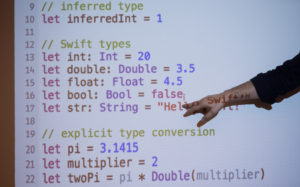
There will be two one week camps for web development.
Students will be introduced to web page development using HTML and CSS. Starting from building their very first web page, they progress to learn about paragraphs, lists, tables, inserting images, audio and video files, and hyperlinking while they work on 14 different hands-on practical do-it-yourself projects, several hands-on programming challenges, and assessment quizzes throughout the course. Finally, they build a photo gallery and their own version of Instagram to complete this course.
This course is ideal for students who are comfortable with text entry. It is recommended that the students have completed at least one Tynker block-coding course so that they are familiar with the basics of programming logic and computational thinking. This course will help them transition to HTML and CSS – the web development languages, and adapt to the additional challenges of text-based syntax.
Students who successfully complete this lesson plan will demonstrate a strong mastery of HTML and CSS syntax, as well as the ability to create their own web sites from scratch. They will be able to create web pages for other projects in their academic curriculum, such as book reports, presentations, and STEM assignments. This course does not cover the use of JavaScript in web development.
There will be a one-week camp for JavaScript.
An introduction to JavaScript for intermediate or advanced coders in upper middle or high school. In this advanced lesson plan, students will be introduced to JavaScript as they complete engaging lessons, solve challenging puzzles, and build their own games in JavaScript. This course is ideal for students who have already completed at least one Tynker course and are comfortable with the basics of programming logic and computational thinking. This course will help them transition to JavaScript and adapt to the additional challenges of text-based syntax.
Students who successfully complete this lesson plan will demonstrate a strong mastery of JavaScript syntax, as well as the ability to creatively program games and other projects and debug their own code. Students will also be able to come up with an idea for a game and take it through the entire design and implementation process, creating custom versions of many of their favorite games in JavaScript.
Introduction to Python for intermediate or advanced coders in upper middle or high school. In this advanced lesson plan, students will be introduced to Python as they complete engaging lessons, solve challenging puzzles, and build their own games in Python. This course is ideal for students who have already completed at least one Tynker course and are comfortable with the basics of programming logic and computational thinking. This course will help them transition to Python and adapt to the additional challenges of text-based syntax.
Students who successfully complete this lesson plan will demonstrate a strong mastery of Python syntax, as well as the ability to creatively program games and other projects and debug their own code. Students will also be able to come up with an idea for a game and take it through the entire design and implementation process, creating custom versions of many of their favorite games in Python.
There will be two one-week Cybersecurity camps presented from the AFA.
The Air Force Association created the CyberPatriot National Youth Cyber Education Program in 2009 to excite K-12 students about cybersecurity and other STEM disciplines critical to our nation’s future. In addition to the summer CyberCamp program, CyberPatriot offers a variety of programs aimed at educating the public about the importance of cybersecurity. These programs include the nation’s largest youth cyber defense competition for high school and middle school students, an Elementary School Cyber Education Initiative (ESCEI), a children’s literature series,
CyberGenerations –a senior citizen cyber safety initiative, and a Tech Caregivers program designed to encourage cyber-savvy volunteers to give back to their communities.
CyberPatriot greatly benefits from the support and technical expertise of the program’s presenting sponsor, Northrop Grumman Foundation, along with Cyber Diamond sponsors AT&T and the AT&T Foundation, Boeing, Cisco, Microsoft, and the U.S. Department of Homeland Security; Cyber Gold sponsors Air Force Reserve, BNY Mellon, Facebook, Symantec, and the USAA Foundation; and Cyber Silver sponsors the Air Force STEM, American Military University, Embry-Riddle Aeronautical University, Gannon University, Leidos, Mastercard, and University of Maryland Global Campus.
For more information about CyberPatriot, visit www.uscyberpatriot.org.